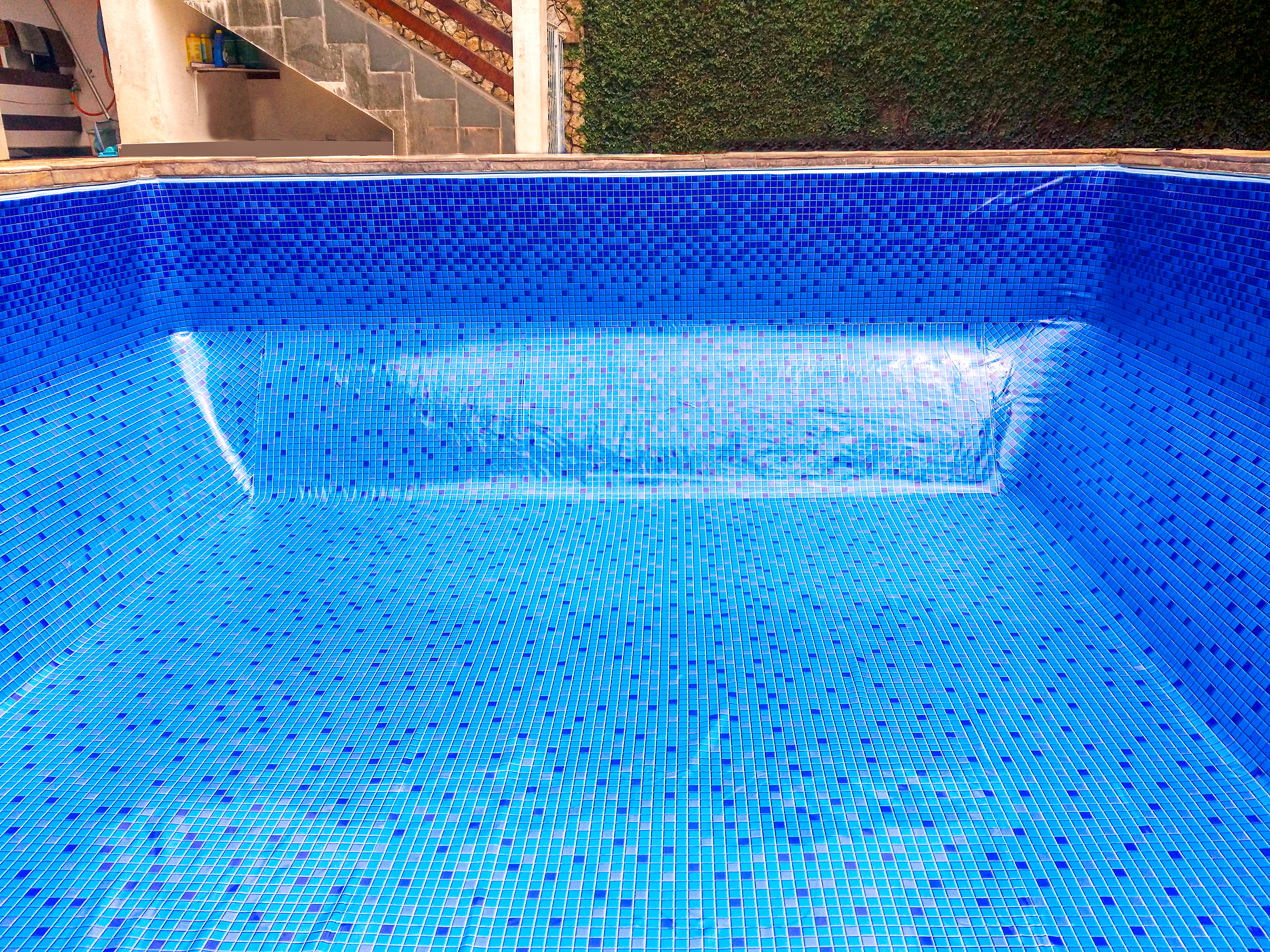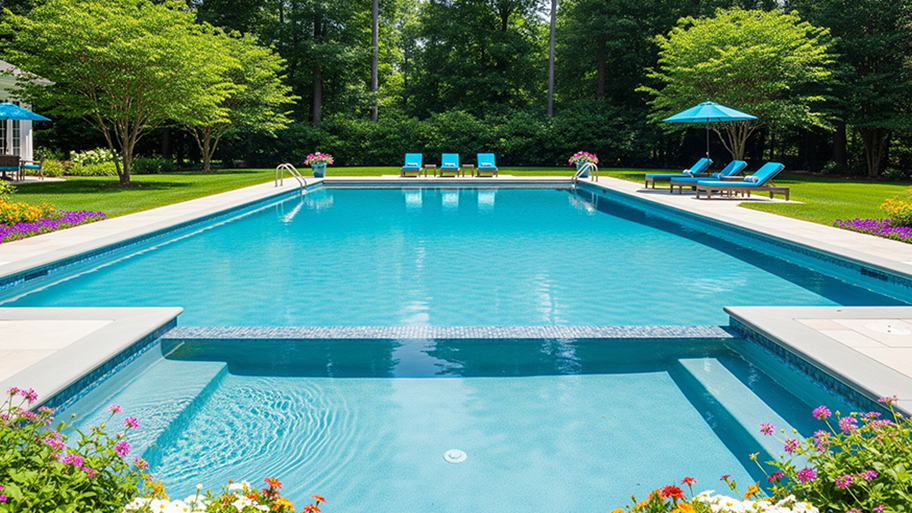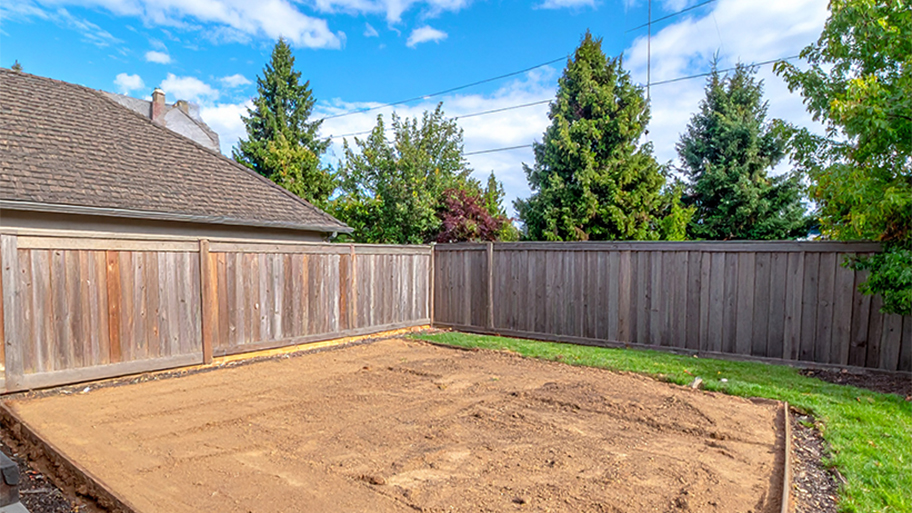
If you’ve been considering installing a new pool in the Buckeye State, this guide will help you understand inground pool costs in Columbus.
Time to brush up on those math skills


The volume of your pool depends on factors like surface area, dimensions, and depth.
Using the dimensions of your pool and simple formulas, you can calculate the volume in gallons for rectangular or circular pools.
For irregularly-shaped pools, you’ll need to break down the pool into smaller regular shapes to find an approximate volume.
If your pool's shape is unique or you’d rather not tackle a math problem, hire a pool pro to determine the volume and recommend chemicals and accessories.
If you have a pool at home, you may wonder, “How many gallons of water are in my pool?” It's helpful information to know as it will help you calculate how many chemicals you need for pool maintenance, as well as what size pool heater you'll need.
It’ll also help you estimate the cost of filling your pool with water. Fortunately, there are relatively simple formulas you can use to calculate pool gallons based on factors like the size and shape of your pool.
To calculate pool volume, you'll need to know several metrics depending on the shape of your pool.
Length and width: If you have a rectangular pool, you'll need to measure its length and width.
Surface area: You also need to know a rectangular pool's surface area, which you can find by multiplying its length by width.
Diameter: For circular pools, you'll need to know the diameter, which is how long the pool is from one side to the other.
Radius: You’ll also need the radius for circular pools, which is calculated by dividing your pool's diameter in half.
Depth: Regardless of your pool shape, you'll need to measure how deep it is to calculate pool volume.
Pi: For circular pools, you’ll need to multiply by 3.14.
You should also consider the slope of the bottom of your pool. If your pool slopes down and gets deeper in certain areas, that will affect your volume calculations.
Use this formula: Length x width x depth x 7.5 = volume in gallons
To calculate the volume of a rectangular pool, you'll first need to measure the length and width of your pool in feet. Next, measure how deep your pool is in feet. If your pool is one consistent depth, i.e., it doesn't have a slope, then all you need to do is multiply its length, width, and depth by 7.5 to determine how many gallons it holds.

| Rectangular Pool Size | Depth | Number of Gallons |
|---|---|---|
| 12' x 12' | 4 feet | 4,320 |
| 12' x 24' | 4 feet | 8,640 |
| 16' x 32' | 4 feet | 15,360 |
| 18' x 36' | 4 feet | 19,440 |
| 20' x 40' | 4 feet | 24,000 |
If your pool has multiple depths, such as a shallow end and a deep end, you'll need to find the average depth across the pool before doing the above calculation. To find the average, measure the depth at the deepest and shallowest points. Then, add them together and divide the resulting number by two.
Use this formula: (Deepest depth + shallowest depth) / 2 = average depth
Once you have the average depth, you can perform the following calculation to find your pool volume:
Length x width x average depth x 7.5 = volume in gallons

Use this formula: 3.14 x (radius x radius) x depth x 7.5 = volume in gallons
When calculating circular pool volume, you'll be working with its diameter and radius, rather than its length and width. You'll also be using your pool's depth and the value of Pi, which you can round to an even 3.14 for these formulas.
To find a circular pool's diameter, measure it from one side to the other from the longest points. Once you find the diameter, divide it by two to find the radius.
Diameter / 2 = radius
In addition to the radius, you'll need to measure your pool's depth in feet. If your pool has multiple depths, then you'll find the average using the average depth formula:
(Deepest depth + shallowest depth) / 2 = average depth
Now that you have all of your metrics, just plug them into the following formula. Note that you'll use the radius twice.
| Circular Pool Size | Depth | Number of Gallons |
|---|---|---|
| 12' in diameter | 4 feet | 3,391 |
| 14' in diameter | 4 feet | 4,616 |
| 16' in diameter | 4 feet | 6,028 |
| 18' in diameter | 4 feet | 7,630 |
| 20' in diameter | 4 feet | 9,420 |
Use this formula: (Length x width x 3.14 / 4) x average depth x 7.5 = volume in gallons
Oval pool volume calculations are similar to circular pools but with one extra step. To calculate oval pool volume, you'll first find the length and width of the pool, measuring them at their longest points. You'll then multiply the length and width by 3.14 and divide the resulting number by 4 to find the surface area. Finally, multiply that number by the average depth and 7.5 to determine the volume.
Use this formula: (Length x width x 3.14 / 4) x average depth x 7.5 = volume in gallons
| Oval Pool Size | Depth | Number of Gallons |
|---|---|---|
| 10' x 16' | 4 feet | 3,760 |
| 12' x 24' | 4 feet | 6,768 |
| 16' x 32' | 4 feet | 12,032 |
| 18' x 36' | 4 feet | 15,227 |
| 20' x 40' | 4 feet | 18,799 |
Finding the volume of irregular and freeform pool shapes is a little trickier than other shapes since it requires additional steps. But the good news is you won't need to use any other calculations besides the ones already listed in this article.
For these pool shapes, you'll want to break the shape down into smaller, more standard shapes. For instance, if you have a kidney-shaped pool, you can find the approximate volume by breaking it up into two circles and using the circular pool calculations outlined above.
If your pool shape is highly irregular, or you simply don't want to fuss with the math, you can always call a local pool pro to help. A pool professional can determine how many gallons your pool holds, as well as give advice about heater size, appropriate chemicals, and pool care mistakes to avoid.
From average costs to expert advice, get all the answers you need to get your job done.

If you’ve been considering installing a new pool in the Buckeye State, this guide will help you understand inground pool costs in Columbus.

The cost of pool liner replacement in Columbus depends on the size and shape of your pool, as well as the liner material and type. Here’s how the costs break down.

Stock tank pools are less expensive than traditional pool options. Find out stock tank pool costs and whether to go for professional installation or DIY.

Baking soda is a budget-friendly way to tackle DIY pool maintenance. Our guide explains how to add baking soda to a pool.

You can build an above ground pool on uneven ground if you take the time to level it. This guide will show you how to level ground for a pool in a few easy steps.

A broken pool light can be dangerous as well as inconvenient. Learn who to call to fix your pool light safely and correctly.